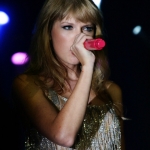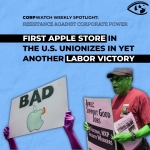USA: New Report Examines Commercialism in Schools
From exclusive soft-drink contracts to computers displaying continuous
advertising, corporate marketing in public schools is rising sharply. But
few states have laws in place to address the phenomenon, and most decisions
on commercial arrangements in schools are made piecemeal by local
officials, according to a report from the General Accounting Office
scheduled to be released today.
"In-school marketing has become a growing industry," the report stated.
"Some marketing professionals are increasingly targeting children in
schools, companies are becoming known for their success in negotiating
contracts between school districts and beverage companies, and both
educators and corporate managers are attending conferences to learn how to
increase revenue from in-school marketing for their schools and companies."
Until now, there has been no comprehensive effort to measure the number of
commercial contracts with schools. But school board officials, consultants
and nonprofit organizations that follow education issues say it is clear
that such contracts are far more common now than they were even two years ago.
About 25 percent of the nation's middle schools and high schools now show
Channel One, a broadcast of news features and commercials, in their
classrooms, and about 200 school districts have signed exclusive contracts
with soft-drink companies to sell their beverages in schools. And in at
least one case, students using computers in classrooms were offered
incentives to enter personal data names, addresses, information on
personal habits which would then be sold to advertisers.
Recognizing that the nation's 47.2 million students are an increasingly
lucrative target market for consumer product companies, school districts
are often willing to join with corporations. They see the money as one way
to supplement tight budgets without having to raise taxes. But at the same
time, few school officials are an even match for experienced corporate
marketers. "They're trained in the three R's, and the R's don't include
retail," one North Carolina school official noted last year.
Over the last three years, many school districts have signed contracts with
soft- drink giants like Coca-Cola and Pepsico, in which vending machines in
hallways function as glowing billboards for their brands. A math textbook
published in 1995 by McGraw-Hill and approved for use in about 15 states
names many consumer products, including Gatorade, Sega and Sony video games
and Nike sneakers, in its problems. McGraw-Hill said it received no
compensation for the use of the corporate names.
Companies like Zap Me, which is based in San Ramon, Calif., offer schools
free computers with screens that include continuously flashing ads. Zap Me
also collects information that students provide and makes it available to
its advertisers including Microsoft and Toshiba, which also supply the
computers said Bob Stern, a spokesman for the company.
The G.A.O. report cites textbook covers distributed by Clairol, Ralph
Lauren, Reebok and Philip Morris with company names and logos fully
displayed. In New York City, the Board of Education is considering a plan
that would provide computers for all of its students, starting in the
fourth grade. The computers might carry ads and possibly encourage shopping
on a particular Web site.
A spokesman for the National Soft Drink Association said local bottlers
signed contracts with the schools in part to support the schools and in
part to promote their products. "The brand loyalty that is gained by having
these products available to kids when they get thirsty during the day is
valuable to these companies," said Sean McBride, the spokesman.
All the activity has aroused concern in communities from Montclair, N.J.,
to Madison, Wis., to Birmingham, Ala., where companies have made deals with
schools that let them promote their products to students. The demand for
product placement in schools has even created a separate consulting niche.
School districts are expected to make decisions about commercial agreements
using their own discretion, said Renee Williams Hockaday, a spokeswoman for
the National School Boards Association in Alexandria, Va. "It is obviously
a growing issue," she said, adding that the agreements "could be something
positive, as long as the students don't turn into walking advertisements
for these companies with no benefit to their learning environment."
The report, prepared over the last year, is the first government study to
address commercialism in schools. It stops short of pinpointing the effects
of in-school advertising, noting that "because advertising in ubiquitous in
America, it is difficult if not impossible to distinguish between the
effects of advertising to which students are exposed inside and outside of
school." The G.A.O. will study the issue again in the next year or so and
quantify the spread of commercial activity in schools.
The report, which includes color photographs of ads atop school bus stops,
over computer carrels and on soda vending machines, was ordered by
Representative George Miller, a Democrat of California, and Senator
Christopher J. Dodd, a Democrat of Connecticut. In an interview, Mr. Miller
said he was prompted by concern over data being collected about students
through computers given to their schools by Zap Me.
"Not a lot of attention is being paid to whether parents agree with this or
want their children to participate or not participate," he said. "Sometimes
parents have a different opinion from that of the superintendent or the
school board."
Senator Dodd said he planned to send letters to parent-teacher groups
around the country to urge them to read the report. There is still time, he
said, for lawmakers and others to resolve the issues. "This hasn't gotten
totally out of hand yet," he said. "Most schools are still doing a pretty
good job." He added, however, that he was shocked that many schools said
they were unaware that the "free" computers they received from companies
could be used to collect, and sell, marketing data from their students.
"There is a tremendous amount of information being solicited and used to
market back to kids without administrative consent or parental consent," he
said. "If you had an 8-year- old or a 10-year-old, would you allow someone
to come into your house to do a survey on your child without your consent?"
The report is being hailed by some as proof that commercial activity in
schools is a growing threat. "This is the first official government
confirmation that commercialism in schools is a problematic issue," said
Andrew Hagelshaw, director of the Center for Commercial-Free Public
Education in Oakland, Calif., which has waged many grass-roots battles
against soft-drink contracts and Channel One. "Public schools are publicly
funded and are supposed to be the one place where kids don't get advertised
to. It's completely inappropriate to turn that venue into a place where
companies get to promote brand-name products."
Mr. Hagelshaw said he had seen something of a backlash against
commercialism in schools recently. Last year, the 15-million-member
Southern Baptist Convention passed a resolution against Channel One,
because it advertises to schoolchildren. In Madison, Wis., one of the first
school districts to sign an exclusive contract with Coca-Cola, the school
board recently voted not to renew the arrangement. San Francisco earlier
this year turned down an exclusive contract with Pepsi, Mr. Hagelshaw said.
Another longtime critic of commercial activity in schools predicted that
the report would encourage state legislatures to act. "This is going to
raise the visibility of this issue enormously," said Alex Molnar, a
professor of education at the University of Wisconsin-Milwaukee, who
directs the university's three- year-old Center for the Analysis of
Commercialism in Education.
Mr. Miller and Mr. Dodd have sponsored a bill, now part of the Elementary
and Secondary Education Act, that is pending before the House and would
require parental consent for market-research activities in schools.
"Let's not pretend this is child's play," Mr. Miller said. "This is not
some benevolent effort to give away computers. This is a cold, calculating
effort to make customers out of children."
Mr. Molnar says students could be harmed by the promotion of products
through schools. "One could argue that a person comes to the marketplace
skeptical, as a consumer," he said, "but in a school, everything that's
going on is supposed to be good for you. When you take that venue and you
exploit it for a particular special interest, you do a lot of damage to
children." For example, he added, soft drinks, candy, snack food and fast
food are all advertised in schools in many places, lending them a
credibility they may not deserve nutritionally.
"Ultimately, this is the kind of thing that promotes cynicism in children,"
he said.
- 180 Media & Entertainment


